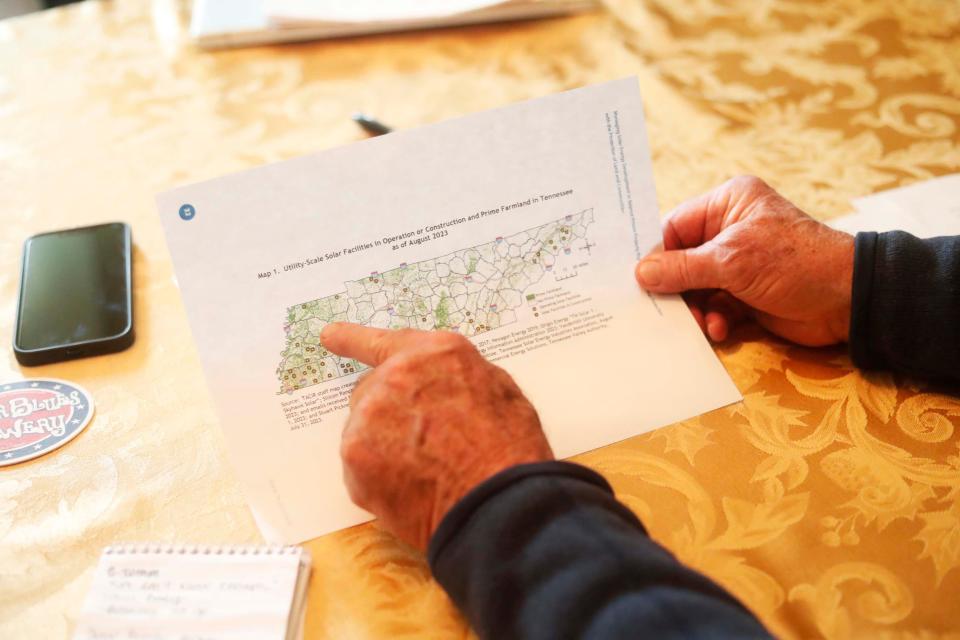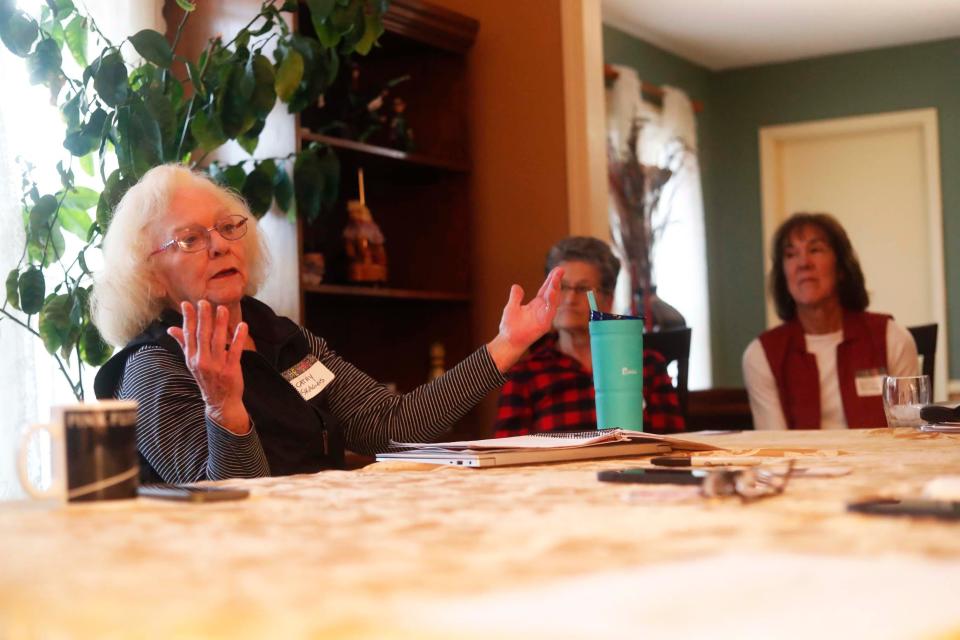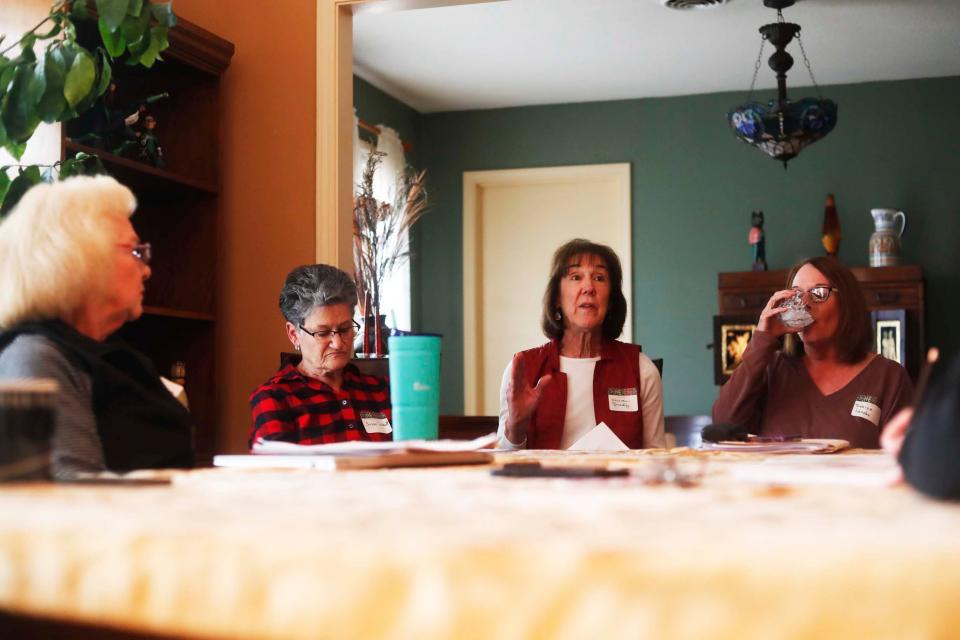A proposed solar farm in Millington is causing problems with nearby residents
The outskirts of Millington could see a major change to its landscape in the next few years. A planned solar farm from a subsidiary of European energy company RWE is going in front of the Shelby County Commission seeking an exception to the moratorium on solar farms passed initially in September.
The moratorium was set to end in March but was extended to May.
RWE has plans to place solar panels on about 600 acres, but have acquired over 1,500 acers for the project, and neighbors in the areas nearest to where the solar panels will be placed are not happy about it.
Latest update: Millington solar farm voted down by Shelby County Commission, lawsuit could follow
The Graceland Solar Project will send the majority of the power to a Meta Platforms Inc. data center in Gallatin, Tennessee and the rest will be sold to the Tennessee Valley Authority. Residents have been active at Shelby County Board of Commissioners meetings and Division of Planning and Development meetings pleading with local officials to put an end to it.
RWE said it has addressed all the concerns of neighbors, and even has gone beyond what is required in terms of setbacks from residents' homes and additional landscaping to try to appease them.

A nationwide analysis by USA TODAY shows local governments are banning green energy faster than they’re building it.
At least 15% of counties in the U.S. have effectively halted new utility-scale wind farms, solar farms, or both. These limits come through outright bans, moratoriums, construction impediments and other conditions that make green energy sources difficult to build.
Why neighbors are concerned
Neighbors said that there has not been enough scrutiny on the zoning laws surrounding large solar developments, also called solar farms, and with little oversight, it could cause major problems in the future for the surrounding environment and land value. RWE said they have been approved by various government oversight boards and have received resounding "yeses" for their development.
The neighbors' concerns range from runoff that could cause erosion to the land, RWE's lack of concern for wildlife in the area, and chiefly, that the solar panels will be an eyesore in their rural neighborhood, leading to plummeting home values.

While some of their concerns about the solar panels are unfound, they still would like to put an end to the development.
RWE said it has tried to negotiate with the neighbors, offering to set back the development so many feet from property lines and placing landscaping around the panels to hide them from plain sight.
Millington community members still will not let up.
John McNeely, who is the director of the solar development in Millington, said that RWE is being very cognizant of not putting a constraint or burden on the taxpayers within Shelby County. The vast majority of the project will be leased, and RWE has only bought about 125 acres. Within the leases, a decommissioning bond has been put in place.
Shelby County news: Shelby Co. trustee to un-post clerk's office incorrect revenue reports; payments to schools behind
Solar decommissioning bonds are used to make sure renewable energy projects are properly decommissioned and the site of the project is restored when it reaches the end of its operational life. RWE is offering to put Shelby County as an additional interest on the bond.
The Graceland Solar Project is part of TVA’s Green Invest partnership with RWE and Meta. The 150-megawatt solar facility will allocate 100 megawatts to Meta for use at its data center in Gallatin. The total megawatts produced are equivalent to powering approximately 24,000 households, McNeely said. The other 40 megawatts will be used for redundancy within TVA’s system.
'Profit has been put over people'
Denise Landau lives on a small road on the outskirts of Millington with her family. Her home looks like it could be located in any small town in the south, with large, mature trees and horses in the distance. It would surprise most that her neighborhood is located just 30 minutes away from Downtown Memphis, and that's why she loves it so much.
Rona Walker said she moved to the area because of the quiet surroundings and because it was away from the crowds in Memphis. Now, she feels like she's being pushed out.
"I feel like I'm being pushed out of the county. "I'm not from Memphis, but I've grown to love this. area. I love my neighbors. I feel safe in this area," Walker said. "I am a widow. I'm a military veteran, Army Veteran, and I'm an educator. And I just really feel like profit has been put over people."

Landau and her neighbors have been fighting against the Graceland Solar Project for months. They have been constantly researching the possible harmful effects of solar panels, erosion from water run-off solar panels, and various zoning laws around the country pertaining to solar farming.
On a recent Friday night, Landau gathered some of her neighbors to talk about how harmful the Graceland Solar project could be to their land, home values and future generations who might live in the area. The concerns have been heard by Millington city officials and the Shelby County Commission, but only one group has the power to stop the solar farm.
The solar farm would directly impact 1,200 homes within a mile of the project, something nearby resident Chuck Brady said will decrease property values as well as cause irreparable harm to the environment.
"All those people are going to be impacted, their property values are going to drop. The construction (is) going to be a one-to-two-year process," Brady said. "They have over 300,000 solar panels, all the steel and the wire all that is coming down Pleasent Ridge Road... just a small country road."

Another concern of neighbors is that the power will not all directly benefit Shelby County. Kathy Skaggs, one of the residents in Millington, said that Shelby County will not be getting any of the renewable energy credits. Skaggs is also concerned if Memphis Light, Gas and Water ever leaves TVA that the solar power on the farm will no longer benefit Shelby County in any way.
"The renewable energy credits doesn't even come to Shelby County. It goes to Facebook...God forbid, MLGW ever wants to walk away from TVA, that land and this project is still devoted to TVA," Skaggs said.
McNeely said that while some of the power generated from the solar farm will be bought by Meta, MLGW grid will also benefit from the power. The electrons produced cannot be controlled to only one place, McNeely said, and the majority of the power will be consumed locally.
"The project that we're proposing to build in North Shelby County connects into an MLGW line... The electrons are going to go and be consumed locally. So because of the fact that you cannot steer electrons, right, I nor TVA, nor MLGW can guarantee that any electron will ever make its way to the Gallatin for metal to be consumed," McNeely said.
More: MLGW replacing street lights with LED lights faster than any other city in the country
Meta is buying the electricity produced to meet sustainability goals, McNeely said.
"The reality is as most projects that are contracted in the power space are settled virtually...and so what the press releases have said about Meta buying electricity from this project is really Meta (buying) the rights to the environmental attributes of the project," McNeely said.
RWE said that the project will produce over 200 jobs during construction, but because solar panels are relatively self-sustaining up to four jobs will stay long-term after the project is complete. Because of this, they are committed to recruiting construction jobs within Shelby County.
USA Today and Commercial Appeal reporter Neil Strebig contributed to this story.
Brooke Muckerman covers Shelby County Government for The Commercial Appeal. She can be reached at (901) 484-6225, [email protected] and followed on X, formerly known as Twitter @BrookeMuckerman.
This article originally appeared on Memphis Commercial Appeal: A solar farm outside of Memphis will power a Meta center over 200 miles away
